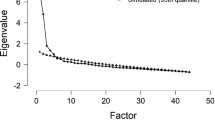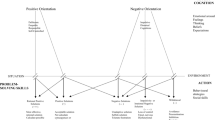Abstract
This study investigated the relation betweeninterpersonal sensitivity and social problem-solving aspredictors of three outcomes in a college population (N= 207): self-esteem, depressive symptoms, and academic performance. Consistent with predictions,interpersonal sensitivity was related to problem-solving-- in particular, negative problem orientation. Bothinterpersonal sensitivity and social problem-solving were significant predictors of self-esteem anddepressive symptoms, each accounting for uniquevariance. Interpersonal sensitivity was a significantpredictor of academic performance, for both males and females. However, in females, social problemsolving was not related to academic performance. Inmales, negative problem orientation and dysfunctionalproblem-solving styles were important aspects of problem solving related to academic performance. Theresults are discussed in terms of the identification of“at risk” college students.
Similar content being viewed by others
REFERENCES
Arean, P. A., Perri, M. G., Nezu, A. M., Schein, R. L., Christopher, F., & Joseph, T. (1993). Comparative effectivness of social problem-solving therapy and reminiscence therapy as treatments for depression in older adults. Journal of Consulting and Clinical Psychology, 61, 1003-1010.
Beck, A. T. (1967). Depression:Clinical, experimental, and theoretical aspects. New York: Harper & Row.
Blankstein, K. R., Flett, G. L., & Batten, I. (1989). Test anxiety and problem-solving self-appraisals of college students. Journal of Social Behavior and Personality, 4. 531-540.
Blankstein, K. R., Flett, G. L., & Johnston, M. E. (1992). Depression, problem-solving ability, and problem-solving appraisals. Journal of Clinical Psychology, 48, 749-759.
Blankstein, K. R., Flett, G. L., & Watson, M. S. (1992). Coping and academic problem-solving ability in test anxiety. Journal of Clinical Psychology, 48, 37-46.
Blatt, S. J. (1995). The destructiveness of perfectionism, American Psychologist. 12, 1003-1020.
Boyce, P., Hickie, I., & Parker, G. (1991). Parents partners or personality? Risk factors for post-natal depression. Journal of Affective Disorders, 21, 245-255.
Boyce, P., Hickie, I., Parker, G., Mitchell, P., Wilhelm, K., & Brodaty, H. (1992). Interpersonal sensitivity and the one-year outcome of a depressive episode. Australian and New Zealand Journal of Psychiatry, 26, 156-161.
Boyce, P., & Parker, G. (1989). Development of a scale to measure interpersonal sensitivity. Australia New Zealand Journal of Psychiatry, 23, 341-351.
Boyce, P., Parker, G., Barnett, B., Cooney, M., & Smith, F. (1991). Personality as a vulnerability factor to depression. British Journal of Psychiatry, 159, 106-114.
Boyce, P., Parker, G., Hickie, I., Wilhelm, K., Brodaty, H., & Mitchell, P. (1990). Personality differences between patients with remitted melancholic and nonmelancholic depression. American Journal of Psychiatry, 147, 1476-1483.
Boyd, J. H., Weissman, M. M., Thompson, D., & Myers, J. K. (1982). Screening for depression in a community sample: Understanding the discrepancies between depression symptoms and diagnostic scales. Archives of General Psychiatry, 39, 1195-1200.
Brown, G. W., & Harris, T. (1978). Social origins of depression. New York: Free Press.
Chang, E. C., & D'Zurilla, T. J. (1996). Relations between problem orientation and optimism, pessimism, and trait affectivity: A construct validation study. Behaviour Research and Therapy, 34, 185-194.
Coyne, J. C., & Whiffen, V. E. (1995). Issues in personality as diathesis for depression: The case of sociotropy-dependency and autonomy-self-criticism. Psychological Bulletin, 118, 358-378.
Cutrona, C. E., & Russell, D. (1990). Type of social support and specific stress: Toward a theory of optimal matching. In I. G. Sarason, B. R. Sarason, & G. R. Pierce (Eds.), Social support: An interactional view (pp. 319-366). New York: Wiley.
Davey, G. C. L., Jubb, M., & Cameron, C. (1996). Catastrophic worrying as a function of changes in problem-solving confidence. Cognitive Therapy and Research, 20, 333-344.
Davidson, J., Zisook, S., Giller, E., & Helms, M. (1989). Symptoms of interpersonal sensitivity in depression. Comprehensive Psychiatry, 30, 357-368.
Derogatis, L. R. (1983). The SCL-90 R: Administration, scoring, and procedures manual II. Baltimore, MD: Clinical Psychometric Research.
Dugas, M. J., Letarte, H., Rheaume, J., Freeston, M. H., & Ladouceur, R. (1995). Worry and problem-solving: Evidence of a specific relationship. Cognitive Therapy and Research, 19, 109-120.
D'Zurilla, T. J. (1986). Problem-solving therapy: A social competence app roach to clinical intervention. New York: Springer.
D'Zurilla, T. J., & Goldfried, M. R. (1971). Problem-solving and behavior modification. Journal of Abnormal Psychology, 78, 107-126.
D'Zurilla, T. J., & Maydeu-Olivares, A. (1995). Conceptual and methodological issues in social problem-solving assessment. Behavior Therapy, 26, 409-432.
D'Zurilla, T. J., & Nezu, A. (1982). Social problem-solving in adults. In P. C. Kendall (Ed.), Advances in cognitive-behavioural research and therapy (Vol. 1, pp. 201-274). New York: Academic Press.
D'Zurilla, T. J., & Nezu, A. M. (1990). Development and preliminary evaluation of the Social Problem-Solving Inventory. Psychological Assessment: A Journal of Consulting and Clinical Psychology, 2, 156-163.
D'Zurilla, T. J., Nezu, A. M., & Maydeu-Olivares, A. (in press). Manual for the Social Problem-solving Inventory-Revised (SPSI-R). North Tonawanda, NY: Multi-Health Systems, Inc.
D'Zurilla, T. J., & Sheedy, C. F. (1991). The relation between social problem-solving ability and subsequent level of psychological stress in college students. Journal of Personality and Social Psychology, 61, 841-846.
D'Zurilla, T. J., & Sheedy, C. F. (1992). The relation between social problem-solving ability and subsequent level of academic competence in college students. Cognitive Therapy and Research, 16. 589-599.
Elliott, T. R., Godshall, F. J., Herrick, S.M., Witty, T. E., & Spruell M. (1991). Problem-solving appraisal and psychological adjustment following spinal cord injury. Cognitive Therapy and Research, 15, 387-398.
Elliott, T. R., Godshall, F., Shrout, J. R., & Witty, T. E. (1990). Problem-solving appraisal, self-reported study habits, and performance of academically at-risk college students. Journal of Counseling Psychology, 37, 203-207.
Elliott, T. R., Herrick, S. M., & Witty, S. M. (1992). Problem-solving appraisal and the effects of social support among college students and persons with physical disabilities. Journal of Counseling Psychology, 39, 219-226.
Elliott, T. R., Herrick, S. M., MacNair, R. R., & Harkins, S. W. (1994). Personality correlates of self-appraised problem solving ability: Problem orientation and trait affectivity. Journal of Personality Assessment, 63, 489-505.
Elliott, T. R., Sherwin, E., Harkins, S. W., & Maramarosh, C. (1995). Self-appraised problem-solving ability, affective states, and psychological distress. Journal of Counseling Psychology, 42, 105-115.
Elliott, T. R., Shewchuk, R., Richeson, C., Pickelman, H., & Franklin, K. W. (1996). Problem-solving appraisal and the prediction of depression during pregnancy and in postpartum period. Journal of Counseling and Development, 74, 645-651.
Flett, G. L., & Blankstein, K. R. (1994). Worry as a component of test anxiety: A multidimensional analysis. In G. C. L. Davey & F. Tollis (Eds.), Worrying: Perspectives on theory, assessment and treatment (pp. 135-181). Chechester, England: Wiley.
Flett, G. L., Blankstein, K. R., Occhiuto, M., & Koledin, S. (1994). Depression, self esteem, and complex attributions for life problems. Current Psychology, 13, 263-281.
Flett, G. L., Blankstein, K. R., Pliner, P., & Bator, C. (1988). Impression-management and self-deception components of appraised emotional experience. British Journal of Social Psychology, 27, 67-77.
Flett, G. L., Pliner, P., & Blankstein, K. R. (1989). Depression and components of attributional complexity. Journal of Personality and Social Psychology, 56, 757-764.
Gotlib, I.H., (1984). Depression and general psychopathology in university students. Journal of Abnormal Psychology, 93, 19-30.
Griffin, D., & Bartholomew, K. (1994). Models of the self and other: Fundamental dimensions underlying measures of adult attachment. Journal of Personality and Social Psychology, 67, 430-445.
Haaga, D. A. F., Fine, J. A., Roscow Terrill, D., Stewart, B. L., & Beck, A. T. (1995). Social problem-solving deficits, dependency, and depressive symptoms. Cognitive Therapy and Research, 19, 147-158.
Haines, M. E., Norris, M. P., & Kasky, D. A. (1996). The effects of depressed mood on academic performance in college students. Journal of College Student Development, 37, 519-526.
Heppner, P. P., & Anderson, W. P. (1985). The relationship between problem-solving self-appraisal and psychological adjustment. Cognitive Therapy and Research, 9, 415-427.
Heppner, P. P., Hibel, J., Neal, G. W., Weinstein, C. L., & Rabinowitz, F. E. (1982). Personal problem solving: A descriptive study of individual differences. Journal of Counseling Psychology, 29, 580-590.
Heppner, P. P., & Krauskopf, C. J. (1987). An information processing approach to personal problem-solving. The Counseling Psychologist, 15, 371-447.
Kanner, A. D., Coyne, J. C., Schaefer, C., & Lazarus, R. S. (1981). Comparison of two modes of stress measurement: Daily hassles and uplifts versus major life events. Journal of Behavioral Medicine. 4, 1-39.
Kant, G. L., D'Zurilla, T. J., & Maydeu-Olivares, A. (1997). Social problem-solving as a mediator of stress-related depression and anxiety in middle-aged and elderly community residents. Cognitive Therapy and Research, 21, 73-96.
Lennen, H., Herzberger, S., & Nelson, H. F., (1987). Depressive attributional style: The role of self esteem. Journal of Personality, 55, 631-660.
Lerner, M. S., & Clum, G. A. (1990). Treatment of suicidal ideators: A problem-solving approach. Behavior Therapy, 21, 403-411.
Maydeu-Olivares, A., & D'Zurilla, T. J. (1996). A factor-analytic study of the Social Problem-Solving Inventory: An integration of theory and data. Cognitive Therapy and Research, 20, 115-133.
Metalsky, G. (1992). Extension of the Rosenberg Self esteem Questionnaire to assess achievement-related, interpersonal-related, as well as global self esteem. Unpublished raw data.
Nezu, A. M. (1985). Differences in psychological distress between effective and ineffective problem solvers. Journal of Counseling Psychology, 32, 135-138.
Nezu, A. M. (1986a). Efficacy of a social problem-solving therapy approach for unipolar depression. Journal of Consulting and Clinical Psychology, 54, 196-202.
Nezu, A. M. (1986b). Negative life stress and anxiety: Problem-solving as a moderator variable. Psychological Reports, 58, 279-283.
Nezu, A. M. (1987). A problem-solving formulation of depression: A literature review and proposal of a pluralistic model. Clinical Psychology Review. 7, 121-144.
Nezu, A. M., & D'Zurilla, T. J. (1989). Social problem-solving and negative affective conditions. In P. C. Kendall & D. Watson (Eds.), Anxiety and depression (pp. 285-315). Toronto: Academic Press.
Nezu, C. M., Nezu, A. M., & Houts, P. S. (1993). Multiple applications of problem-solving principles in clinical practice. In K. T. Kuehlwein & H. Rosen (Eds.), Cognitive therapies in action (pp. 353-378). San Francisco: Jossey-Bass Publishers.
Nezu, A. M., & Perri, M. G. (1989). Social problem-solving therapy for unipolar depression: An initial dismantling investigation. Journal of Consulting and Clinical Psychology, 57, 408-413.
Nezu, G. F., & Ronan, G. F. (1987). Social problem-solving and depression: Deficits in generating alternatives and decision making. The Southern Psychologist, 3, 29-34.
Paulhus, D. L. (1991). Measurement and control of response bias. In J. P. Robinson, P. R. Shaver & L. S. Wrightsman (Eds.), Measures of personality and social psychological attitudes (pp. 17-59). Sandiego, CA: Academic Press.
Radloff, L. (1977). The CES-D Scale: A self-report depression scale for research in the general population. Applied Psychological Measurement, 1, 385-401.
Rosenberg, M., (1965). Society and the adolescent self-image. Princeton, NJ: Princeton University Press.
Sacco, W. P., & Graves, D. J., (1984). Childhood depression, interpersonal problem-solving, and self ratings of performance. Journal of Clinical Child Psychology, 13, 10-15.
Sadowski, C., & Kelly, M. L. (1993). Social problem-solving in suicidal adolescents. Journal of Consulting and Clinical Psychology, 61, 121-127.
Sadowski, C., Moore, L. A., & Kelley, M. L. (1994). Psychometric properties of the social problem-solving inventory (SPSI) with normal and emotionally disturbed adolescents. Journal of Abnormal Child Psychology, 22, 487-500.
Sher, K. J., Wood, P. K., & Gotham, H. J. (1996). The course of psychological distress in college: A prospective high-risk study. Journal of College Student Development, 37, 42-51.
Smith, R. J., Arnkoff, D. B., & Wright, T. L. (1990). Test anxiety and academic competence:A comparison of alternative models. Journal of Counseling Psychology, 37, 313-321.
Wang, L. Heppner, P. P., & Berry, T. R. (1997). Role of gender-related personality traits, problem-solving appraisal, and perceived social support in developing a mediational model of psychological adjustment. Journal of Counseling Psychology, 44, 245-255.
Watson,D., & Clark, L. A., (1984). Negative affectivity: The disposition to experience aversive emotional states. Psychological Bulletin, 96, 465-490.
Watson, D., Weber, K., Smith Assenheimer, J., Clark, L. A., Strauss, M. E., & McCormick, R. A. (1995). Testing a tripartite model: I. Evaluating the convergent and discriminant validity of anxiety and depression symptom scales. Journal of Abnormal Psychology, 104, 3-14.
Rights and permissions
About this article
Cite this article
McCabe, R.E., Blankstein, K.R. & Mills, J.S. Interpersonal Sensitivity and Social Problem-Solving: Relations with Academic and Social Self-Esteem, Depressive Symptoms, and Academic Performance. Cognitive Therapy and Research 23, 587–604 (1999). https://doi.org/10.1023/A:1018732707476
Issue Date:
DOI: https://doi.org/10.1023/A:1018732707476




